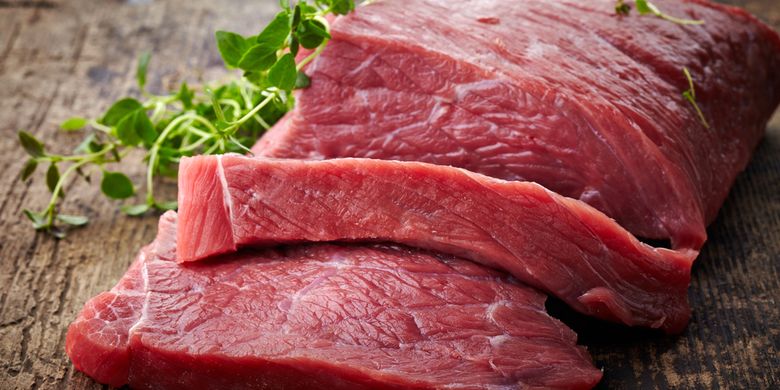KOMPAS.com – Vitamin B is essential to ensure that the body’s cells function properly.
Launch Medical News Today, B vitamins of which can help the body convert food into energy (metabolism), make new blood cells, and maintain healthy skin cells, brain cells, and body tissues.
Many people can get enough of the B vitamins by eating a variety of nutrient dense foods.
Also read: 10 Foods High in Vitamin D
If it is difficult to meet daily B vitamin requirements from food, a person can take supplements under the supervision of a doctor.
A person may experience a B vitamin deficiency if their body depletes too many nutrients because they have certain health conditions or are undergoing certain medications.
Launch NHS, vitamin B consists of not only one type, but up to eight types.
Together, these eight types of B vitamins can be referred to as vitamin B kompleks.
These different types of B vitamins often appear together in the same food.
The following is a further explanation of each of the B vitamins and their benefits for the body:
1. Thiamin ( vitamin B1)
Vitamin B1 or thiamin is needed by the body to:
- Breaks down and releases energy from food
- Maintain a healthy nervous system
- Making certain neurotransmitters (brain chemicals)
- Producing fatty acids
- Synthesize certain hormones
Also read: 14 Foods High in Vitamin C
Vitamin B1 can be found in many types of food.
Good sources of vitamin B1 include:
- Peas
- Some fresh fruit (such as bananas and oranges)
- Nuts
- Whole wheat bread
- Some breakfast cereals are fortified with this vitamin
- Heart
So, how much vitamin B1 does the body need?
The amount of vitamin B1 in adults (ages 19 to 64) is 1 mg daily for men and 0.8 mg daily for women.
Vitamin B1 cannot be stored in the body, so you need it in your diet every day.
Also read: 18 Foods High in Vitamin E
2. Riboflavin ( vitamin B2)
Riboflavin or vitamin B2 is useful, among others, to help:
- Maintain healthy skin, eyes and nervous system
- The body releases energy from food
- Helps the body break down fat, drugs, and steroid hormones
- Converting tryptophan to niacin ( vitamin B3)
- Converts vitamin B6 into coenzymes that the body needs
Vitamin B2 can be found in many types of food.
Here are some foods that are high in vitamin B2:
- Milk
- Egg
- This nutrient-fortified breakfast cereal
- Mushroom
- Yoghurt plain
UV rays can destroy riboflavin, so ideally these foods should be kept out of direct sunlight.
Also read: 10 Foods That Are High in Magnesium
So, how much vitamin B2 is needed?
The required amount of riboflavin for adults (ages 19 to 64) is about 1.3 mg daily for men and 1.1 mg daily for women.
You should be able to get all the vitamin B2 you need from your daily diet.
Riboflavin also cannot be stored in the body, so you need it in your diet every day.
3. Niacin (vitamin B3)
The body converts niacin into a coenzyme called nicotinamide adenine dinucleotide (OVER).
NAD is an important part of more than 400 different enzyme reactions in the body, the highest of all vitamin-derived coenzymes.
Also read: 10 Calcium-Rich Foods, Not Just Milk
This enzyme helps by:
- Converts the energy in carbohydrates, fats, and protein into forms the body can use
- Metabolism peoses in body cells
- Communication between cells
- Expression of DNA in cells
There are 2 forms of vitamin B3 that the body needs, namely nicotinic acid and nicotinamide.
Both can be found in food.
Foods that contain vitamin B3 include:
- Meat
- Fish
- Wheat flour
- Egg
So, how much vitamin B3 is needed?
Adults should take about 16.5mg daily of niacin for men and 13.2mg daily for women.
Also read: 12 Foods High in Vitamin B3
You should be able to get all the niacin you need from your daily diet.
Vitamin B3 it cannot be stored in the body, so you need it in your diet every day.
4. Pantothenic acid ( vitamin B5)
Vitamin B5 the body needs to make new coenzymes, proteins, and fats.
Red blood cells carry vitamin B5 throughout the body so that they can use the nutrients in various processes for energy and metabolism.
Vitamin B5 can be found in varying amounts in nearly all vegetables, whole grain foods, and meats, but good sources include:
- Chicken
- Beef
- Liver and kidney offal
- Egg
- Mushroom
- Avocado
Also read: 12 Foods High in Antioxidants
Breakfast cereals are also a good source when fortified with this vitamin B5.
So, how much vitamin B5 is needed?
Adult men and women (19-64 years) need to take the same amount of vitamin B5, which is about 5 mg a day.
Pantothenic acid cannot be stored in the body, so you need it from food every day.
5. Vitamin B6
Vitamin B6, also known as pyridoxine, is necessary for the body to:
- Using and storing energy from protein and carbohydrates in food
- Forms hemoglobin, a substance in red blood cells that carries oxygen throughout the body
- Brain development
- Immune function
Also read: 10 Foods High in Polyphenols
Vitamin B6 can be found in a wide variety of foods, including:
- Pork
- Poultry, such as chicken or turkey
- Several fish
- Nuts
- Soybeans or tofu
- Avocado
- Banana
- Milk
- Some fortified breakfast cereals
So, how much vitamin B6 is needed?
The amount of vitamin B6 for adults (ages 19 to 64) is about 1.4 mg daily for men and 1.2 mg daily for women.
Also read: 9 Foods High in Calcium
You should be able to get all the vitamin B6 you need from your daily diet.
The bacteria that live naturally in your intestines are also capable of producing vitamin B6.
6. Biotin ( vitamin B7)
Biotin is needed in very small amounts to help the body:
- Breaks down fats, carbohydrates and protein
- Communication between cells in the body
- DNA regulation
Bacteria that live naturally in the intestines are known to be able to make biotin.
So it’s unclear whether you need additional biotin from food.
However, biotin can also be found in a variety of foods, but only at very low levels.
Food sources containing B7 include:
- Red meat
- Egg
- Biji-bijian
- Nuts
Also read: 14 Foods Containing High Sodium
7. Folate and folic acid ( vitamin B9)
Folate is vitamin B9 which can be found in many foods.
The man-made form of folate is called folic acid.
Folate is also known as folacin.
Among them folate can help the body:
- Forms healthy red blood cells
- Reduces the risk of birth defects called neural tube defects, such as spina bifida, in an unborn baby
Lack of folate itself can cause folate deficiency anemia.
Vitamin B9 these can be found in small amounts in many foods.
Also read: 14 Foods Containing High Folic Acid
Foods that contain folic acid, including:
- Broccoli
- Brussels sprouts
- Green leafy vegetables, such as cabbage, kale, spring greens, and spinach
- Peas
- Beans and kidney beans
- Liver (but avoid this during pregnancy)
- Breakfast cereal fortified with folic acid
So, how much folate does the body need?
Adults need 200 micrograms (mcg) of folate a day.
There are no long-term deposits in the body, so you need to eat foods that contain folate frequently.
Most people should be able to get the amount of folate they need by eating a varied and balanced diet.
If you are pregnant or in a pregnancy program, it is recommended that you take a supplement of 400 mcg of folic acid daily until you are 12 weeks pregnant.
Taking this supplement is important to help prevent neural tube defects, such as spina bifida, in your baby.
Also read: 9 Types of Vitamins and Minerals Recommended for Pregnant Women
Some women have an increased risk of pregnancy affected by neural tube defects and are advised to take a higher dose of 5 mg of folic acid daily until they are 12 weeks pregnant.
This is important and is unlikely to cause harm, as it is taken in the short term, but it would be better to talk to your doctor first.
Get more advice on vitamins and minerals during pregnancy, including who should take higher doses of folic acid.
8. Vitamin B12
Vitamin B12 is involved in helping the body:
- Make red blood cells and keep the nervous system healthy
- Releasing energy from food
- DNA synthesis
- Use of folate
- Support fneurological and brain function
Deficiency vitamin B12 alone can cause vitamin B12 deficiency anemia.
There are many foods that contain vitamin B12.
Good sources include:
- Meat
- Fish
- Milk
- Cheese
- Egg
- Some fortified breakfast cereals
So, how much vitamin B12 is needed?
Adults (ages 19 to 64) need about 1.5 mcg of vitamin B12 a day.
If you eat meat, fish, or dairy products, you should be able to get enough vitamin B12 from your diet.
But because vitamin B12 isn’t found naturally in foods such as fruits, vegetables, and whole grains, vegans may not get enough of it.
Also read: 12 Foods High in Vitamin B12
– .

